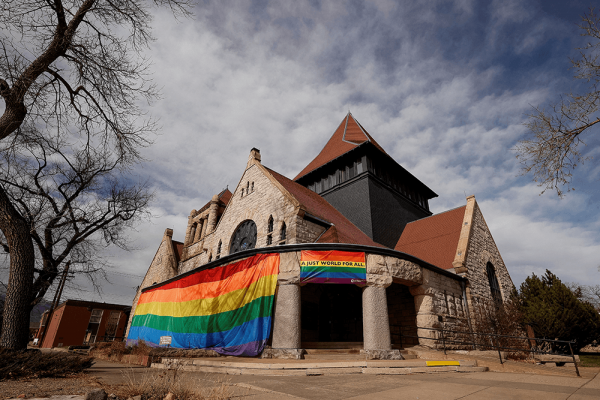Thom Andreas was a gay Christian kid in the 1990s when his hometown of Colorado Springs, Co., was becoming known as the “evangelical mecca” or “evangelical Vatican.” And this gave Andreas a front-row seat as the movement advocated against LGBTQ rights and dignity in politics and faith.
“A lot of the drivers for a lot of that early anti-LGBT legislation were part of [my church] growing up,” Andreas told Sojourners.
Focus on the Family, the conservative evangelical nonprofit, settled in Colorado Springs at the beginning of the decade, and Colorado passed ballot initiative “Amendment 2” in 1992, which prohibited the state from making laws to protect LGBTQ people from discrimination; the amendment was struck down by the Supreme Court in 1996.
Andreas watched the amendment process up close: His family attended the same Presbyterian church as Will Perkins, the chairman of Colorado for Family Values, which crafted Amendment 2. Andreas said that Perkins was a mentor to him during his youth.
“I struggled throughout my younger years [in Colorado Springs], because, of course, I couldn't be who I was,” he said.
From quiet acceptance to open advocacy
In his young adulthood, Andreas started to come out. While he was beginning to get involved in LGBTQ advocacy — co-editing an LGBTQ publication and volunteering at the Pride center — his family was still pressuring him toward ex-gay programs. Eventually, he was kicked out of his family home. He began “picking up the pieces,” and started attending a United Church of Christ in Colorado Springs, and eventually settled at Grace and St. Stephen’s Episcopal Church, both affirming churches in the city.
At Grace and St. Stephen’s, he leads a group for LGBTQ folks providing what he hopes is a “safe space for people to talk, get to know each other, and ask questions.”
He said that type of space has been hard to find in Colorado Springs, but that’s starting to change. Even in his own congregation, church members are starting to realize it’s not enough to be passively affirming, but that the church needs to be active in their protection and affirmation of LGBTQ people.
“Some of what’s happened just in the last five, six years, woke a lot of people up to say it’s not enough to sit on the side…” Andreas said. “You actually have to say something. You have to ‘say gay,’ you have to put it out there, because otherwise the other side is gonna win.”
Ray Killian attends First Christian Church, a Disciples of Christ congregation in Colorado Springs. He had previously served as music director for the Lesbian and Gay Chorus of D.C. in the 1990s; in the early 2010s, he moved to Colorado Springs to be the church’s music director. He still remembers what the city’s LGBTQ celebration was like back then:
“When I first did Pride here, I sang on the Pride stage in the little park downtown and maybe there were a hundred people for Pride,” he told Sojourners.
While First Christian had been practically affirming for decades — hiring gay pastors and paying for gender-confirming surgeries — but it had not gone through the denomination’s official process of becoming an “Open & Affirming” congregation. That process, which the church completed in 2017, was important for the message it sent to the Colorado Springs community, he said.
“We have Focus on the Family, The Navigators … Andrew Wommack [and Charis Bible College] up in Woodland Park,” Killian said, listing off non-affirming faith organizations in the region. “So, we felt that we need to be intentional about it and … that we could serve the community with more integrity had we gone through the process … Let’s face it, the other side is very intentional about who they direct [others] to, what scriptures they’re using, and what the result of all that is.”
Seeing the fruits of effort
Following the Nov. 19 shooting at an LGBTQ nightclub in Colorado Springs that killed 5 people, mourners met in a local Unitarian church in an outpouring of support for the LGBTQ community. Several other churches held vigils throughout the week. Soon after the shooting, more than 50 pastors in the region signed a letter of support for the LGBTQ community.
“I can't even conceive of that happening — for fear of retribution, even against churches — back into 2010,” Killian said.
For people like Killian, who can remember when Christian antagonism toward LGBTQ people was the dominant attitude in Colorado Springs, this outpouring of ecumenical support a sign of the impact that LGBTQ-affirming ministry and activism has had on the community.
“The changes that are here are very encouraging,” Killian said. “And I'm particularly grateful to have witnessed it, along with a lot of the other folks here in Colorado Springs.”
At Grace and St. Stephen’s, Andreas and the church’s rector, Fr. Jeremiah Williamson, co-moderated a conversation on being queer and Christian to answer parishioner questions five weeks ago — just weeks before the shooting. Williamson and Andreas expressed a mutual appreciation for each other and the work they’ve been doing within the church.
Williamson, who joined Grace and St. Stephen in 2016, just after the church’s leadership voted to affirm same-sex marriages — the first Episcopal church in the city to do so. In the time that he’s been at the church, he’s tried to emphasize queer inclusion from biblical and theological bases, rather than politics or politeness.
“If I want to talk about folks who are nonbinary or trans, I [preach] about Acts 8 and the Ethiopian eunuch,” Williamson told Sojourners. “What is this acceptance of somebody that is outside of the ‘standard,’ dualistic understanding of gender expression?”
Since Williamson joined the church, Grace and St. Stephen has joined the city’s Pride march each year. It was important, he said, for the church not just to welcome LGBTQ people in its space, but to go to LGBTQ celebrations and show solidarity.
Andreas, however, pointed to another dimension of Grace and St. Stephen’s evolution: The church flew Pride flags from its own building last summer, a signal to the entire city that the church was inviting and celebrating its LGBTQ members.
In the weeks following the Club Q shooting, the history of Colorado Spring evangelicals, and its impact on the LGBTQ community, has been measured and remembered across the U.S., but Andreas said it’s not the only story of faith and LGBTQ people in the city.
“In this town in particular, the big movers and shakers in this town have all been religious for the most part — or at least religious friendly,” he said. “There’s always been this tinge and a kind of coloring of religion as part of the [LGBTQ] activism in Colorado Springs. Which I think, interestingly enough, has made it quite strong.”
Got something to say about what you're reading? We value your feedback!




